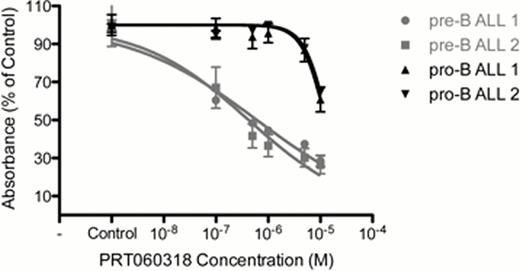Abstract
Abstract 3532
B cell acute lymphoblastic leukemia (B-ALL) arises by transformation of progenitor (pre-B) cells. Cure rates in adults remain low and treatment is complicated by microenvironment-mediated resistance to cytotoxic drugs, indicating an urgent need for development of new, more targeted treatment approaches. Spleen tyrosine kinase (Syk), a B cell receptor (BCR)-associated tyrosine kinase, recently was identified as a novel therapeutic target in mature B cell malignancies, such as chronic lymphocytic leukemia (CLL). Besides its role in BCR signaling in mature B cells, Syk also plays an important role in maintenance and expansion of immature B cells. Syk-deficient mice display a severe defect of B lymphopoiesis, with a block at the pro-B to pre-B transition, consistent with a key role for Syk in pre-BCR signaling. We therefore hypothesized that pre-B ALL cells which express pre-BCRs might be more sensitive to Syk inhibition than other ALL subtypes, which either do not have functional pre-BCRs (pro-B ALL) or display modifying genetic lesions (Ph+/BCR-ABL+ B-ALL).
PRT060318, a highly specific, ATP-competitive, small molecular inhibitor of Syk, has preclinical activity in CLL and DLBCL models (Hoellenriegel J et al., Leukemia 26:1576–83, 2012). Syk specificity was confirmed by cellular and non-cellular kinase inhibition assays. We performed metabolic assays using the tetrazolium dye XTT to screen B-ALL cell lines (RS4;11, REH, TOM-1, Nalm-20, Nalm-21, Nalm-6, 697, Kasumi-2, KOPN-8, RCH-ACV, SMS-SB) for responses to PRT060318. ALL cells were incubated with increasing concentrations of PRT060318 (100 nM – 10 μM) for 72 hours. Based on the XTT assays, we determined half maximal inhibitory concentration (IC50), and separated B-ALL cells into responsive (IC50 < 4.5 μM) and non-responsive (IC50 > 4.5 μM) groups. Interestingly, the responsive group consisted only of pre-B ALL cells (CD10+, TdT+, cytoIgμ+), whereas the resistant group comprised only ALL cell lines with a pro-B cell phenotype (CD10+/−, TdT+, cytoIgμ-). All BCR-ABL positive cell lines tested exhibit the pro-B cell phenotype and, similar to their BCR-ABL negative counterparts, were resistant to PRT060318. The Figure depicts XTT assay results for two PRT060318-sensitive pre-B (grey lines) and two resistant pro-B (black lines) B-ALL cell lines. Western Blot analysis demonstrated SYK protein expression in all B-ALL cell lines, excluding lack of target protein expression as possible cause for different response rates between pre-B and pro-B ALL cells. Cell proliferation assays revealed a significant, dose-dependent inhibition of pre-B ALL cell proliferation by PRT060318. Concordantly, dose depended S phase reduction was detected in all PRT060318-sensitive cell lines. In apoptosis assays, in which sensitive pre-B ALL lines were incubated with increasing concentrations of PRT060318 (up to 5 μM) we did not find any significant induction of apoptosis, suggesting anti-proliferative, rather than cytotoxic effects as a main mechanism of action of PRT060318. Preliminary data of primary ALL patient samples, cultured with KUSA-H1 marrow stroma cells in the presence or absence of PRT060318 demonstrate induction of apoptosis in 3 out of 10 samples, other assays are ongoing. In conclusion, we provide evidence that the Syk inhibitor PRT060318 thwarts pre-B ALL cell proliferation, providing a first rationale for clinical testing of PRT060318 in selected patients with B cell ALL.
Coffey:Portola Pharmaceuticals Inc.: Employment. Sinha:Portola Pharmaceuticals Inc.: Employment. Pandey:Portola Pharmaceuticals Inc.: Employment.
Author notes
Asterisk with author names denotes non-ASH members.


This feature is available to Subscribers Only
Sign In or Create an Account Close Modal